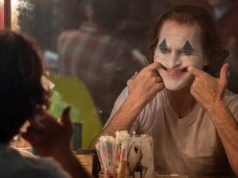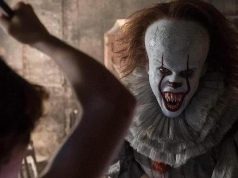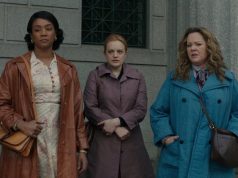The damage inflicted on the X-Men franchise by the poorly received “X-Men: The Last Stand” and “X-Men Origins: Wolverine” wasn’t quite as extensive as the harm done to Batman by the infamous “Batman & Robin,” but the brand was definitely in need of similar revitalization. Unlike “Batman Begins,” though, “X-Men: First Class” doesn’t start from scratch. Instead, it uses the themes of the previous movies to build an intelligent, fast-paced, and highly entertaining prequel. It also re-raises the bar for superhero flicks in general, which have gotten complacent lately.
Like most stories, this one starts with the Nazis. In 1944, young Erik Lehnsherr (Bill Milner) displays telekinetic powers when he’s separated from his mother in a concentration camp, thus drawing the attention of a nasty doctor (Kevin Bacon, speaking German and everything!) who wants to study, harness, and replicate Erik’s abilities. At the same time, in New York state, a wealthy British boy named Charles Xavier (Laurence Belcher), who can read minds, meets a girl named Raven (Morgan Lily) who can shapeshift but whose natural state is blue and scaly.
In 1962, Charles has grown up to be a brilliant and compassionate scientist (now played by James McAvoy) seeking to understand genetic abnormalities, while Erik has grown up to be an angry, vengeful man (now played by Michael Fassbender) who’s obsessed with tracking down the doctor who tortured him. Raven (now Jennifer Lawrence) isn’t angry, but she is frustrated at being saddled with a mutation that, unlike Charles’, is physically obvious.
These three are not the only mutants in the world, mind you. That Nazi doctor, now going by the name Sebastian Shaw, is traveling with a few sinister ones — a telepath (January Jones) made out of diamonds (or something?), a dude who can blow windstorms (Alex Gonzalez), and a teleporter (Jason Flemyng) — in his quest to do secret, dastardly things. The CIA gets involved when agent Moira MacTaggert (Rose Byrne) stumbles upon the existence of mutant powers and figures America better get onboard with this, what with it being the Cold War and all.
“X-Men” (2000) B
“X2: X-Men United” (2003) B+
“X-Men: The Last Stand” (2006) B-
“X-Men Origins: Wolverine” (2009) C+
“X-Men: First Class” (2011) A-
“The Wolverine” (2013) C+
“X-Men: Days of Future Past” (2014) B
“Deadpool” (2016) B
“X-Men: Apocalypse” (2016) C+
“Logan” (2017) B
We know that Charles and Erik are destined to become Professor X and Magneto, one leading the peaceful band of crime-fighting mutants, the other at the head of the militant faction that views non-mutants as enemies. When they first meet, Charles and Erik have the same goal — to thwart Sebastian Shaw — but different motives for it. This gets to the heart of what all the X-Men films have been about: being “different” in a society that sometimes rewards differentness and sometimes vilifies it. Are these powers a blessing or a curse? Do they make you better, or do they make you defective?
Raven finds comfort in befriending Hank (Nicholas Hoult), a scientist with mutant powers almost as readily apparent as hers who’s formulating a serum to change that. He and Raven don’t want to get rid of their abilities altogether; they just don’t want them to be obvious when they go out in public. Other young mutants, like the fire-blasting Alex Summers (Lucas Till), the glass-shattering Sean Cassidy (Caleb Landry Jones), and the fairy-winged Angel Salvadore (Zoe Kravitz), have varying feelings about their abilities, ranging from defensive to self-conscious, meek to defiant. Not all of these characters are fully developed — even a movie with a 132-minute running time has its limitations, apparently — but they add flavor. The movie manages to make each mutant’s power crucial at some point without getting too contrived (although I’m not exactly clear on how Sean, aka Banshee, is able to fly).
“X-Men: First Class” was directed by Matthew Vaughn, whose previous features gave him practice with the elements vital to this one’s success. “Layer Cake” was a twisty, stylish crime caper set in something like the real world; “Stardust” was pure fairy-tale fantasy; and “Kick-Ass” was about an amateur superhero. All three were energetic and confident, as is the new film, which dashes assuredly from one rousing sequence to the next yet never feels like it’s employing action just for action’s sake. With a screenplay credited to Vaughn, regular collaborator Jane Goldman, and the “Thor” duo of Ashley Edward Miller and Jack Stentz, the film strives to put the mutants’ powers in a real-world context, with real-world repercussions. It uses actual events like the Cuban Missile Crisis and the Nazis’ experiments with genetics as the backdrop. Few things are clear-cut; the line between hero and villain is sometimes hard to see. Erik and Charles, though they disagree on tactics, are not enemies, and both men’s points of view are understandable. The issues they face are too complex to be boiled down to a simple “right” and “wrong” way to proceed. Meanwhile, the truly evil Sebastian Shaw is a reflection of each man’s worst potential: Like Charles, he started out being interested in the science behind mutation; like Erik, he came to believe mutants were inherently superior to regular mortals. Either man could go down the wrong path and end up like Shaw.
I come to this movie with no investment in its characters or their origins. I have no idea how much of what’s established here violates comic book canon, and I don’t remember the previous movies well enough to say whether this one negates what happens in them. (Does Charles Xavier doing such-and-such in “First Class” mean he couldn’t have done some other thing that we saw him do in “X2: X-Men United”??? Dunno!) What I do know is that the movie feels smarter and more ambitious than many of its brethren, not to mention more thrilling and flat-out fun. The central performances by Michael Fassbender and James McAvoy are unusually nuanced for a superhero flick, somehow vulnerable and badass at the same time. This is how it’s done, folks! Your move, Captain America.
— Film.com
A- (2 hrs., 12 min.; )





